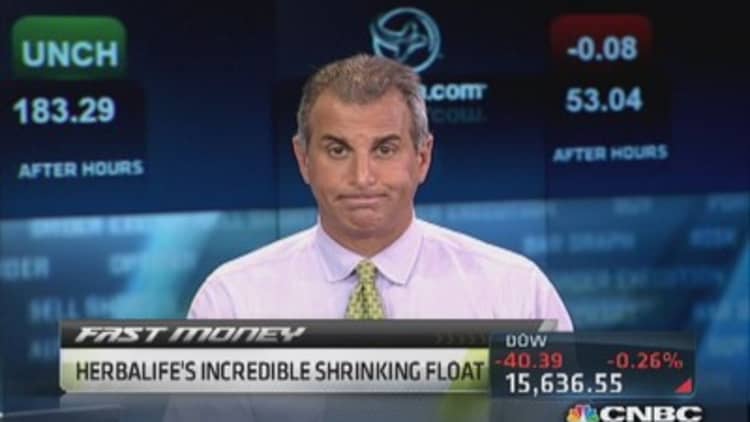On its official website, Herbalife makes a level-headed pitch for its herbal tea mixes: "Ditch the coffee and soda for this refreshing and tasty alternative. Feel reinvigorated with this natural energy lift, our answer to fatigue caused by stress. It's delicious, instant and low in calories."
There's even an asterisk to note that the Food and Drug Administration has not evaluated these claims.
But in the hands of one independent Herbalife distributor based in West Delhi, India, peddling her wares on Facebook, that same herbal tea mix offers a lot more upside.
Among her "9 Reasons to Drink more Herbal Concentrate Beverage," it "may suppress lung cancer growth," "may halt colorectal cancer" and, most enticingly, "it causes prostate cancer cells to commit suicide."
Another India distributor's LinkedIn profile, deleted after CNBC.com requested comment from Herbalife via email, explained that "Nutritional herbal food helps to maintain your Weight & Health."
The distributor added, "We have also achieved good results in controlling Acidity, Asthma, Blood Pressure, Cancer, Diabetes, Heart Diseases, Cells Proper Counting, Thyroid, Knee Pain, Back Pain, Body Weakness, Women's Health, Metabolisms, Child's Physical & Mental Growth, Under Weight, Over Weight & Physical Fitness / Health etc."
India has seen rapid growth in network marketing in recent years. The country is responsible for more than $1 billion a year in direct selling revenue—up nearly 23 percent in 2012, making it one of the fastest-growing global markets, according to the World Federation of Direct Selling Associations.
Herbalife has been near the forefront of that business, with operations in India since 1999. In 2012, the company's sales in that country rose nearly 41 percent in local currency—making it Herbalife's third-largest market in Asia-Pacific and one of its top 10 markets worldwide, with sales of about $140 million. The company has 2,500 nutrition clubs in India, and all of them are sent a disclaimer on product claims in eight languages that is to be posted on the wall.
(Read more: )
But Herbalife admits that rapidly expanding a network of home-based entrepreneurs with no training doesn't make policing distributor conduct easy. And it would seem to follow that monitoring is toughest in fast-growing emerging markets where Herbalife's on-the-ground presence is most limited.
In the risk factors section of its most recent 10-K filing, Herbalife said, "Our distributors are independent contractors and, accordingly, we are not in a position to directly provide the same direction, motivation and oversight as we would if distributors were our own employees. As a result, there can be no assurance that our distributors will participate in our marketing strategies or plans, accept our introduction of new products, or comply with our distributor policies and procedures."
Still, Herbalife spokeswoman Barb Henderson said the company is alert to misleading product claims.
Herbalife has 250 staff members worldwide in its distributor business practices and compliance department, she said, and it takes misconduct seriously.
"We have nearly 300,000 Herbalife members in India, and the overwhelming majority behave in accordance with our rules," Henderson said. "During the past 12 months, we have had 84 cases in India relating to product claim issues. ... While the incidence rate is extremely low, our sanctions with respect to those cases range from coaching to fines to termination."
(Watch more: Herbalife: The easiest trade ever?)

That Herbalife opened only 84 cases out of more than 300,000 distributors over the past year means one of two things: Either only 0.028 percent of its India distributors are making misleading product claims, or the company cannot intercept many of the misleading claims its salespeople make. The disclosure in its risk factors and the easy-to-find misleading claims on social media indicate the latter might be the case.
In recent years, Indian authorities have stepped up enforcement against network marketers they believe are harming consumers. In May, top Amway India executives were arrested over complaints about losses from failed distributors. In a statement, Amway said, "Their detention was uncalled for as they did nothing wrong, and we continue to work toward fair resolution in the case."
In August, Mumbai police charged QNet, a Hong Kong-based multilevel marketer, with misleading consumers about the ability of plastic products to cure cancer. QNet has not commented publicly about the case, and requests for comment were not returned.
Both cases are making their way through the system.
To date, Herbalife hasn't run into significant regulatory issues in its most important overseas markets, although a Belgian court ruled in that 2011 that it is an illegal pyramid scheme. The company is appealing that decision.
But with allegations about Herbalife's practices drawing attention after Bill Ackman's massive bet against the company and subsequent complaints from U.S.-based consumer groups, overseas regulators may look anew at its practices. And the difficulty in policing its distributors' conduct that the company admits to in its SEC filings might create problems.
—By Zac Bissonnette, Special to CNBC.com. Follow him on Twitter @ZacBissonnette.

